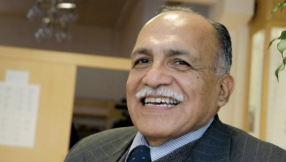Court hears âlocked-inâ syndrome case
Tony Nicklinson, 58, from Wiltshire, suffers from locked-in syndrome brought on by a stroke in 2005. He is almost completely paralysed and has to communicate through a special computer.
The High Court has heard similar cases on assisted suicide, but the extent of Mr Nicklinson’s paralysis means that a doctor would have to end his life for him, a practice known as euthanasia.
Mr Nicklinson told the BBC that his life was a “living nightmare” and that it was “unacceptable” in 21st century Britain to be denied the right to take his own life because he was physically handicapped.
"90% of itches have to be endured because by the time someone comes to scratch it and I have laboriously explained where it is, the itch has gone. Now I just put up with them,” he said.
"Or there is the screaming frustration of wanting to make a point but knowing that the only way I can express my opinion, by the board or computer, are useless in normal conversation."
He added: “A one-size-fits-all solution of better care and more of it, such as opponents advocate, is clearly not the answer. The option of assisted dying should be available.”
Mr Nicklinson is asking the court to rule that the existing law breaches his human right to die at his own choosing.
His barrister, Paul Bowen QC, said the law was “failing to protect the very people it is intended to protect” and had not stopped the “widespread” practice of euthanasia but “has forced it underground where it is unregulated”.
“It encourages those with the means and the ability abroad to Switzerland, where they meet their end earlier than they might otherwise wish; and for those without the means it offers Hobson’s choice of an amateur DIY suicide or continued suffering,” he said.
However, pro-life campaigners believe that a change in the law could lead to exploitation of the vulnerable.
Dr Peter Saunders, head of the Christian Medical Fellowship, wrote in the CMF blog that most sufferers of locked-in syndrome do not wish to die.
“No one can help but be sympathetic to Tony Nicklinson but cases like his are extremely rare and hard cases make bad law,” he said.
“The overwhelming majority of people with severe disability – even with ‘locked-in syndrome’ – do not wish to die but rather want support to live and the longer people have locked-in syndrome then generally the better they learn to cope with it and find meaning, purpose and contentment within the confines of the condition.”
He continued: “The desire to die is not primarily about physical symptoms but about the particular person and their ability to adapt to living with a profound disability.
“Much as we sympathise with Tony Nicklinson, we should not be seeking technical solutions like euthanasia to what is in reality an existential problem.
“That would be a very dangerous precedent indeed.”













